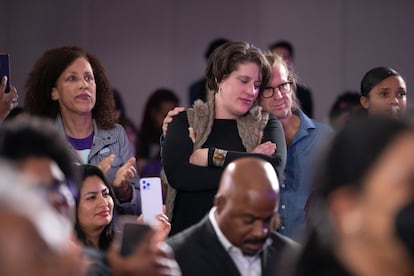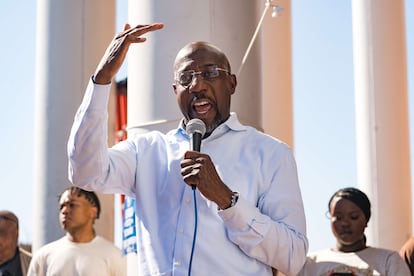Georgia holds the keys to US Congress again
The swing state has re-elected Republican governor Brian Kemp but is heading for a runoff to decide a Senate seat between Herschel Walker and Democrat Raphael Warnock


Georgia has lived up to its reputation and history as a swing state split almost exactly evenly between Democrats and Republicans. Republican Governor Brian Kemp has successfully seen off a second challenge in four years from Democratic candidate Stacey Abrams but in the most important battle between Democratic Senator Raphael Warnock and Republican candidate and former NFL star Herschel Walker, the result remains in the balance despite the fact that over 95% of votes had been counted by early Wednesday morning.
Appearing before his supporters shortly after midnight, Warnock appeared to acknowledge that a runoff will be required to separate the candidates. The Democrat, though, expressed optimism. “Whether it’s later tonight or tomorrow or four weeks from now, we will hear from the people of Georgia,” he said to cheers from an eclectic crowd of races and ages backed by a funk soundtrack.
A few miles away, Walker addressed his own Republican supporters at a similar event. “I haven’t come here to lose,” he told an audience that was generally whiter and older than his opponent’s and where country music was the musical selection of choice. But his own optimism could not hide an irrefutable fact: Governor Kemp achieved almost five percentage points more in the share of the vote than Walker, whose Donald Trump-endorsed candidacy has been punctuated by controversies surrounding his personality and beliefs, generating a lack of enthusiasm among sections of the Republican electorate.
Warnock, a Baptist pastor, and Walker, a former NFL running back, were separated by just a few thousand votes early Wednesday. As a third candidate, the libertarian Chase Oliver garnered 2% of the votes, and neither the Republican or Democrat were able to achieve the necessary majority of 50% plus one vote to avoid a runoff. Everything pointed to a second round for a decisive winner to emerge, as was the case in Georgia in the 2020 presidential elections.
If a runoff is required, depending on results in other states, the same situation that arose two years ago could be repeated: that the results of a Georgia runoff will ultimately decide which party controls the Senate. Before the midterms, there was an even 50-50 split between Republicans on one side and Democrats and Independents on the other, with Vice President Kamala Harris holding a tie-breaking vote.
The significance of the Warnock-Walker matchup had generated enormous interest in Georgia, which was once a staunch Republican stronghold but is now increasingly diverse. In a state of 10 million inhabitants, 2.5 million went to the polls in advance. Another 1.5 million cast their ballots on Tuesday. No line-ups, no crowds, but no respite.

No incidents as Atlanta residents go to the polls
At a polling station installed at the church of Saint James in Buckhead, a wealthy neighborhood in north Atlanta, election official Jimmy Little confirmed that by 12pm (local time) more people had already voted than during the 2020 elections, when turnout records were broken. “And without any kind of incident,” he added proudly.
Many voters in Buckhead said they didn’t have to think particularly long or hard about where their affiliations lay: “Crime. That is what worries me the most when it comes to voting, absolutely. A candidate’s house was robbed nearby today. It’s a huge problem. The jails are full, criminals are released without bail and are walking the streets. Of course, I voted Republican,” says a man in his sixties who identifies himself as J.B. Matt, a financial specialist, also seems to have leaned toward the Republicans, although he doesn’t confirm it explicitly: “For me, the most important thing is to be provided for. That’s what decided my vote.”
In the same electoral precinct, Mary Nasrallah, a 38-year-old healthcare worker, stated the issue of reproductive rights compelled her to vote after the Supreme Court overturned Roe v. Wade, the 1972 ruling that legalized abortion at the federal level. “I want to give a voice to the people of Atlanta who need it,” she said.
One of the Democrats’ greatest concerns has been suppression of the minority vote. The passing in Georgia last year of the Election Integrity Act, or SB202, unleashed a wave of criticism: the measure tightens voting requirements and affects mostly minorities and the underprivileged, limiting access to voting by mail and allowing anyone to scrutinize the electoral process at the polls or to challenge another citizen’s vote. The Democrats and voter mobilization organizations feared the law that it could be used to prevent the most disadvantaged from exercising their right to vote.
However, incidents were minimal. A thousand absentee ballots were not sent to those who had requested them, some polling stations had to stay open longer than anticipated and one polling station observer was expelled with her son when her remarks made it clear that she had participated in the January 6, 2021 assault on the Capitol.
Tu suscripción se está usando en otro dispositivo
¿Quieres añadir otro usuario a tu suscripción?
Si continúas leyendo en este dispositivo, no se podrá leer en el otro.
FlechaTu suscripción se está usando en otro dispositivo y solo puedes acceder a EL PAÍS desde un dispositivo a la vez.
Si quieres compartir tu cuenta, cambia tu suscripción a la modalidad Premium, así podrás añadir otro usuario. Cada uno accederá con su propia cuenta de email, lo que os permitirá personalizar vuestra experiencia en EL PAÍS.
¿Tienes una suscripción de empresa? Accede aquí para contratar más cuentas.
En el caso de no saber quién está usando tu cuenta, te recomendamos cambiar tu contraseña aquí.
Si decides continuar compartiendo tu cuenta, este mensaje se mostrará en tu dispositivo y en el de la otra persona que está usando tu cuenta de forma indefinida, afectando a tu experiencia de lectura. Puedes consultar aquí los términos y condiciones de la suscripción digital.








































